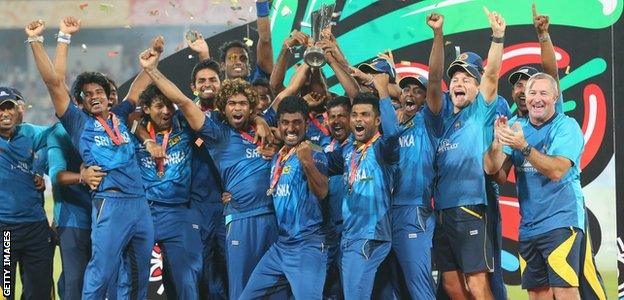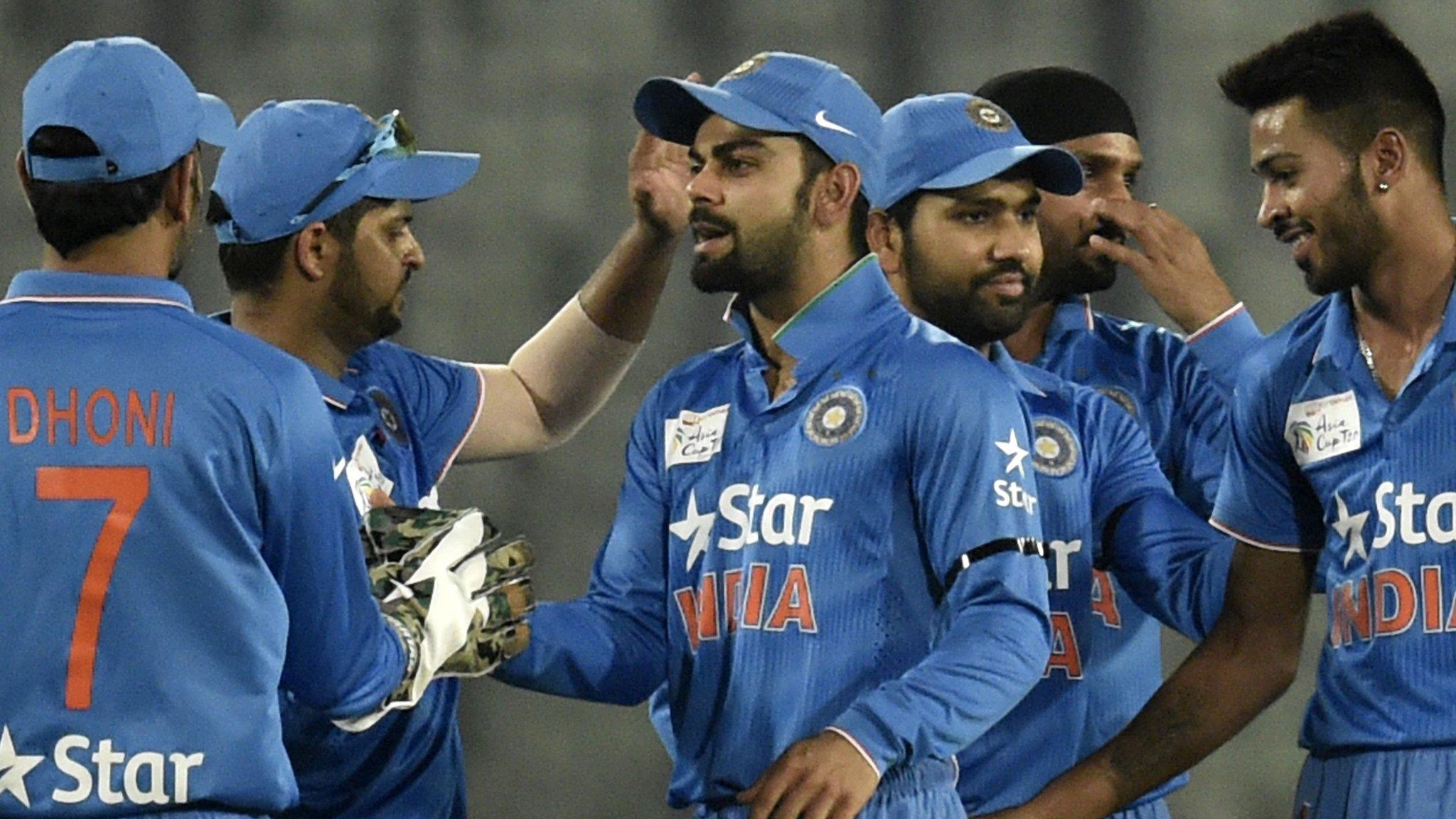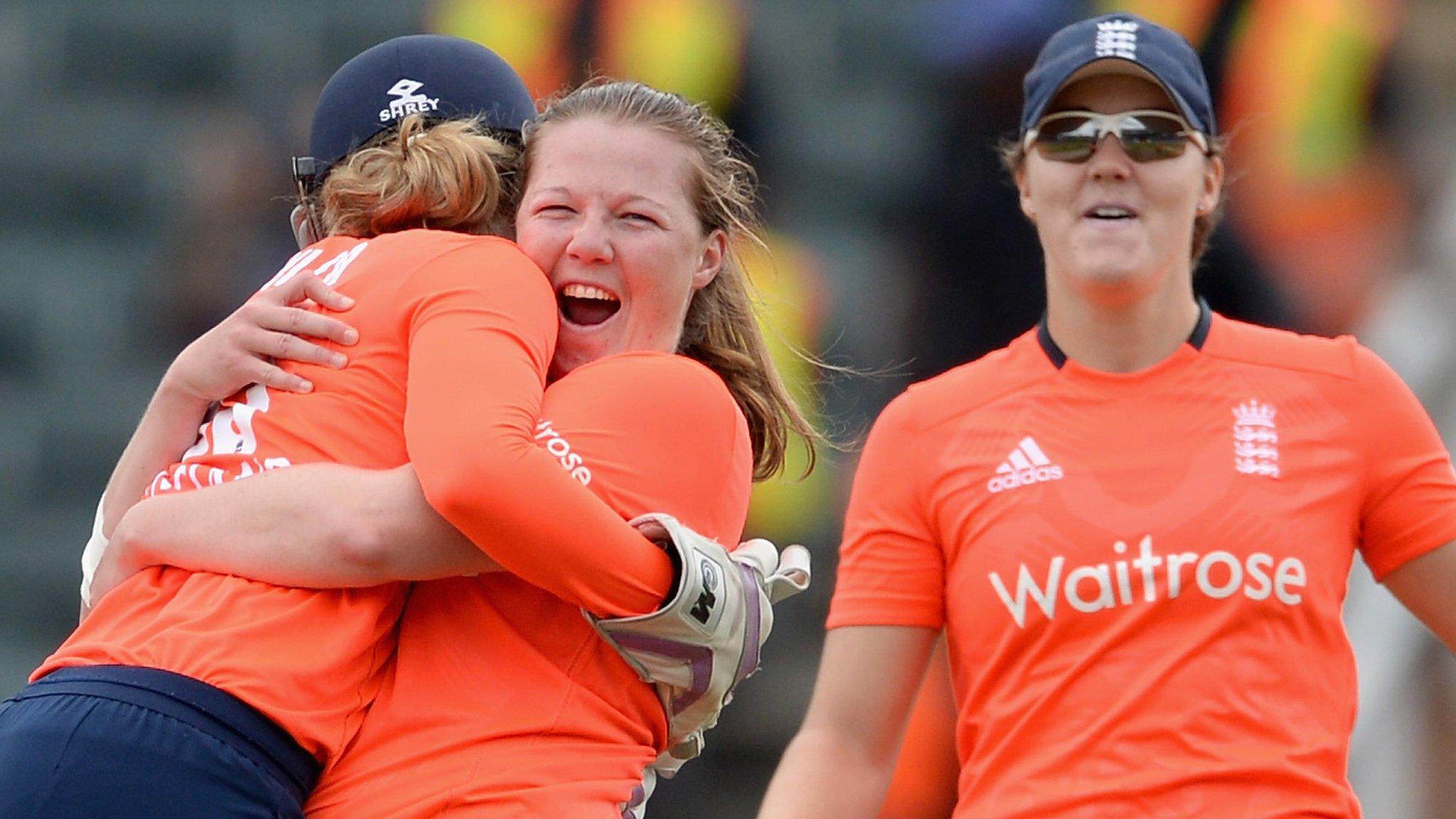World Twenty20 2016: Stuart Broad & Paul Farbrace on how to win
- Published

Five different teams have won the first five World Twenty20 tournaments
Hit it miles, bowl six yorkers an over and catch the ball any time it strays into your postcode.
That's the way to win the World Twenty20, right?
The problem is, every other side in India will see those three steps to success as a given.
For England, the World T20 has been a capricious mistress. The triumph of 2010, external and what remains their only global limited-overs trophy is a high sandwiched by humiliating twin defeats by the Netherlands., external
Arriving at this year's tournament, the optimism of six successive wins was slightly punctured by a 2-0 series defeat in South Africa - getting out of a group involving the Proteas and past two champions West Indies and Sri Lanka will be a huge challenge.
England do, however, have Paul Farbrace, Sri Lanka's successful coach two years ago on their staff. He and 2010 winner Stuart Broad described what can be learned from their experiences of World T20 glory.
Know the conditions
Six years ago in the Caribbean, Kevin Pietersen was named man of the tournament for his 248 runs, but England's success was also built on an attack that did not concede a score higher than 147.
"We adapted to the conditions better than any other team," said Broad, who is on standby to join the England squad in India if required. "The pitches were slow and the grounds were gusty, so we wanted batsmen hitting into the wind at all times.
"We had left-armer Ryan Sidebottom at one end, Tim Bresnan and myself at the other, with two spinners in the middle really tying things down. Our skill was adapting."
Since 2010, England have done anything but adapt. In the tournaments held in Sri Lanka and Bangladesh, external they have won only three of their nine games. Cracking the white-ball code in spin-friendly Asia remains a mystery.
While Broad says England are "lucky" to have the slow-bowling all-round options of Moeen Ali and Adil Rashid, it is batting on the subcontinent that has traditionally been an English weakness.
"India will be a perfect example where there are smaller grounds and perfect outfields and all you have to do is play good cricket shots and keep your shape," said England coach Trevor Bayliss. "The longer you bat the easier it is to score runs."
Do your homework
Though England aren't overly blessed with experience, captain Eoin Morgan survives from the victorious squad of 2010 and 10 of the 15-man squad have had the chance to scout opposition in the various domestic T20 leagues around the world.
In Bayliss they have a coach who has won both the Indian Premier League and the Big Bash, while Farbrace can bring the meticulous method he employed with Sri Lanka.
"I had six analysts providing headlines at the end of every game, then more detailed data the following morning," Farbrace said.
"For instance, in the final against India, I knew to expect them to go very hard with the bat in overs four and five. We were ready for that and only conceded 12 runs.
"We also knew that, at the end of the innings, they found wide yorkers the hardest deliveries to score off.
"We set a field with four men behind square on the off side and Lasith Malinga and Nuwan Kulasekara bowled brilliantly to it. They only scored 15 off the final three overs."

Farbrace (far right) guided Sri Lanka to their first major trophy since the 1996 World Cup
Big players, big performances
Not only did Pietersen thrive in 2010, Graeme Swann was fifth on the wicket-takers' list, while Craig Kieswetter and Broad returned man-of-the-match performances, external in the final and semi-final respectively.
"When the the big stage comes, you look to your bigger players to put in performances," Broad said.
The England class of 2016 is packed with batsmen with the ability so steal the limelight - Morgan, Alex Hales, Joe Root, Jos Buttler and Ben Stokes. The bowling, however, could be exposed.
"In 2014, we had big players - Angelo Mathews, Lasith Malinga, Mahela Jayawardene and Kumar Sangakkara - who enjoyed the big moments," Farbrace said.
"This England team can be very similar. They're all capable, they all love the big stage, they all love international cricket and they all want to be the man of the moment.
"We genuinely have got fantastic match-winners throughout our batting order, while the inexperience of the bowling brings a lack of fear."
Jos Buttler - The Enforcer
Peak at the right time
Not one winner of the previous five editions of the World T20 has gone through the tournament unbeaten. All but one - Sri Lanka last time out - had to rely on net run-rate to get through one of the group stages.
The lesson for Morgan's men? Accept you're likely to lose a match along the way, but get it right if you reach the knockouts.
"We nearly went out in the first group stage in 2010," Broad said. "Then we found a rhythm, a template that worked. It was like clockwork. We won all five games after that."
Farbrace not only tasted success with Sri Lanka, but disappointment too. In 2009, when he was assistant coach, they won every game up to the final, only to be beaten by Pakistan at Lord's., external
"It doesn't matter how you get to the semis, just get there," he said. "After that, any one of the four left in can win the tournament."
ICC World Twenty20 winners | |
|---|---|
2007 | India |
2009 | Pakistan |
2010 | England |
2012 | West Indies |
2014 | Sri Lanka |
Thrive on the pressure
The chances are that the winners of the World T20 will have at some point come through a clutch moment - defending a small total, needing three to win off the final ball, maybe even a super over - all of this in front of the most raucous, fanatical and unforgiving cricket fans in the world.
England failed their last pressure test, missing a final-ball run-out in the first T20 against South Africa, but in addition to 2010 winner Morgan, the squad contains four Ashes winners, while Adil Rashid and David Willey both played in this year's Big Bash semi-finals.
"You shouldn't be scared of crowds, you shouldn't be scared of a bit of pressure," said Broad, who has played in each of the five previous World T20 tournaments. "That's what you live for, that's why you train. You're not training to play in a friendly, you're training to play in World Cups in front of 60,000 and millions on TV.
"That's what should really fire you up and give you excitement. It's a test of who's got it and who hasn't.
"That's why you're in the gym at 7am, that's why you bowl your overs in training, that's why you hit thousands of balls because, when that moment comes, you want to be able to take it. Back your gut instinct, especially in T20."
Ride your luck
It's inconceivable to think that the team celebrating in Kolkata on 3 April will not have had some help from Lady Luck. A spot of rain here, an umpiring decision there, calling correctly at a crucial toss.
"We were walking out for the anthems in the 2010 final," said Broad. "Captain Paul Collingwood leant down to ask the name of the mascot he was holding hands with. 'My name is Lucky,' he said. He looked round and said 'boys, it's our day'.
"Luck plays a huge part in T20 cricket. It does come down to really small moments, so you need that to go your way."
More tangible than a lucky mascot was the benefit Sri Lanka got in 2014 from captain Dinesh Chandimal getting a one-match ban for a slow over-rate, sparing them a difficult decision over a skipper who had reached double figures in only four of his previous 11 innings.
Lasith Malinga took over, won a crucial game against New Zealand and Sri Lanka did not bother going back to Chandimal.
"In 20-over cricket, you never know," Farbrace said. "In 2014 we could have gone out in the group stage, then we changed the captain, and we still went on to win.
"Anything is possible if you genuinely believe it."
- Published14 March 2016

- Published14 March 2016

- Published14 March 2016

- Published10 March 2019

- Published15 May 2018

- Published18 October 2019
